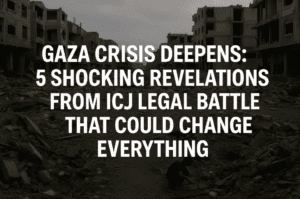Gaza Crisis Deepens: 5 Shocking Revelations from ICJ Legal Battle that Could Change Everything
The Gaza conflict has escalated with Palestinian representatives accusing Israel of creating a humanitarian catastrophe through blockades on food, medicine, and fuel, while obstructing aid. Israel denies intentionally targeting civilians, framing its actions as self-defense against Hamas. The International Court of Justice (ICJ) is examining Israel’s obligations under the Fourth Geneva Convention, with implications for international law. Meanwhile, Israeli airstrikes continue to claim civilian lives, with over 52,000 Gazans reported dead.
The blockade has left millions facing severe food insecurity, drawing condemnation from human rights organizations. Israel’s ban on UNRWA operations further complicates aid efforts, with the agency rejecting claims of staff ties to militants. The ICJ’s advisory opinion could shape future international pressure on Israel, but enforcement remains uncertain. The immediate priority for Gaza’s civilians is unimpeded access to humanitarian aid.

Gaza Crisis Deepens: 5 Shocking Revelations from ICJ Legal Battle that Could Change Everything
The International Court of Justice (ICJ) in The Hague became a focal point for escalating tensions over the Gaza conflict this week, as Palestinian representatives accused Israel of systematically “starving, killing, and displacing” civilians while obstructing humanitarian aid. Israel, absent from the proceedings, reiterated its denial of intentionally targeting civilians or aid workers, framing its actions as self-defense against Hamas.
Key Accusations and Israel’s Defense
Palestinian Ambassador Ammar Hijazi presented a stark indictment at the ICJ, alleging Israel’s military campaign has created a “man-made humanitarian catastrophe” through blockades on food, medicine, and fuel. He cited the near-collapse of Gaza’s aid infrastructure, with the World Food Programme confirming its stocks are depleted. Israel’s Foreign Minister Gideon Saar countered by accusing UN agencies like UNRWA of complicity with Hamas, claiming the group uses civilian facilities for military purposes. Israel’s government submitted evidence purporting ties between UNRWA staff and militants, though UN investigations have yet to corroborate widespread misconduct.
The ICJ’s Role and Broader Implications
The hearings stem from a UN General Assembly request for an advisory opinion on Israel’s obligations to facilitate humanitarian aid in occupied territories. While non-binding, such opinions carry legal weight and could influence international pressure campaigns. Legal experts note the case hinges on interpretations of the Fourth Geneva Convention, which prohibits collective punishment and mandates protection for civilians during conflict.
Humanitarian Toll and On-the-Ground Realities
Recent Israeli airstrikes in Beit Lahia, Gaza City, and Khan Younis killed at least 27 Palestinians, including women and children, according to local health officials. Survivors described entire families buried under rubble, underscoring the human cost of the conflict. Over 52,000 Gazans have reportedly died since hostilities resumed in March 2025, though Israel disputes these figures, attributing high casualties to Hamas’s use of civilian areas.
The blockade has left 2.3 million Gazans facing acute food insecurity, with aid groups warning of preventable deaths from malnutrition and disease. “Israel’s restrictions on aid trucks aren’t just bureaucratic—they’re lethal,” said a spokesperson for Medical Aid for Palestinians.
Legal and Moral Quandaries
International law scholars emphasize that deliberately depriving civilians of essentials constitutes a war crime. “Even if Israel claims military necessity, proportionality must be assessed,” said Leiden University’s Professor Liesbeth Zegveld. Meanwhile, Human Rights Watch recently condemned the blockade as “a form of collective punishment,” urging third-party states to intervene.
UNRWA’s Contested Role
Israel’s ban on UNRWA operations, enacted in January 2025, has drawn criticism for exacerbating the crisis. While Israel alleges 1,400 UNRWA staff have militant ties, the agency—which employs 13,000 in Gaza—calls the claims exaggerated. “Cutting UNRWA’s funding punishes civilians for political grievances,” argued UNRWA Commissioner-General Philippe Lazzarini.
Path Forward
The ICJ’s ruling, expected in months, may intensify calls for ceasefires or sanctions. However, with Israel dismissing the proceedings as biased, enforcement remains uncertain. For Gaza’s civilians, the immediate need is unimpeded aid access. As diplomatic battles rage, the stakes for survival grow daily—a reality underscored by a Khan Younis father mourning his children: “No court can bring them back, but maybe it can stop more from dying.”
You must be logged in to post a comment.